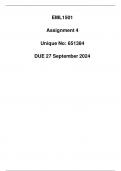EML1501
Assignment 4
Unique No: 651384
DUE 27 September 2024
, Question 1
1.1a. Justification for Reading as Essential for Children’s Social and
Cognitive Development
Reading is crucial for children's social and cognitive development for several
reasons. First, it enhances cognitive skills such as comprehension, critical
thinking, and problem-solving abilities. As children read, they are exposed to
new vocabulary and ideas, which aids in the development of their language
and reasoning skills. According to research by Cunningham and Stanovich
(1998), children who engage in reading frequ ently exhibit greater literacy skills
and intellectual development than their less-engaged counterparts.
Second, reading contributes to social development by exposing children to
diverse perspectives, experiences, and cultures. It fosters empathy as
children navigate different characters' emotions and situations. Reading also
plays a pivotal role in socialization; children learn social norms, values, and
morals through storylines they encounter in books (Duke & Bennett-
Armistead, 2003). Moreover, discussing books with peers and caregivers
encourages social interactions, helping children to develop communication
skills and relationships.
In summary, reading fosters cognitive growth through improved literacy skills and
critical thinking, while additionally promoting social skills through exposure to
diverse narratives and shared discussions.
1.1b. Reading and Writing as Inseparable Components of Literacy
Development
Reading and writing are regarded as inseparable components of literacy
development due to their interdependent nature. When children read, they
encounter the written language, which enhances their understanding of
sentence structure, grammar, and vocabulary. This familiarity with text informs
their own writing skills, allowing them to emulate styles and formats they have
read. According to the National Reading Panel (2000), a clear correlation
exists between reading proficien cy and writing ability.
Conversely, writing helps reinforce reading comprehension. When children write
about what they have read, they engage in deeper cognitive processing,
which aids retention and understanding of the material. Writing provides an
opportunity for children to articulate their thoughts and opinions about texts,
further enhancing critical thinking (Graham & Hebert, 2010).
Thus, the synergy between reading and writing not only enhances overall literacy
skills but also facilitates a deeper understanding of language, ultimately
contributing to emergent literacy development in children.




